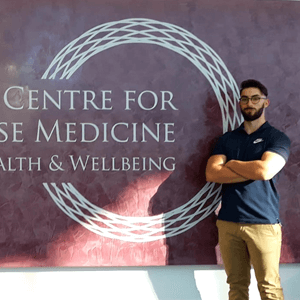I chose to study at Loughborough University as I was aware that it is ranked as the number one institution worldwide for sport-related subjects*. I was also aware that the University produces meaningful research and had found out that the module leaders are all well-recognised in their fields.
In addition, I did not find any other MSc that integrated aspects from different fields of sports science to explore musculoskeletal health. The facilities also seemed excellent and the course was just what I was looking for.
The course combines non-regular modules which makes it very interesting. Some are almost clinical, which gives a great insight into how musculoskeletal injuries are approached and treated, as well as the respective rehabilitative processes involved.

Novel health and biomechanical technologies are also examined, making the collection of data completer and more efficient timewise towards the completion of laboratory studies. The many practical laboratory sessions are of great help, and academic members of staff were always very helpful and supportive throughout my MSc journey. Our class had a variety of international students with different backgrounds such as sport scientists, physiotherapists, medical doctors… so I found it a rich experience to learn from others who had different perspectives on the same topic, depending on their previous experience and education.
Following my graduation, I worked as an R&D researcher in biomechanical technologies, improving the health of different types of population from the elderly to elite athletes. This was achieved by optimising rehabilitation pathways and emphasising musculoskeletal injury prevention. Day-to-day, I had to work with a large and diverse team, composed of professionals such as biomedical engineers, computer engineers, medical doctors, surgeons, physiotherapists and more.
Now, after a year working in Spain, I have returned to the UK to start my PhD studies at Loughborough University, titled “Optimising rehabilitation pathways for severely injured personnel”. I will investigate the relationship between muscle size, strength, gait and functional outcomes for a military population following single or bilateral lower limb amputation via the collection of anthropometric measurements; comprehensive gait analysis; the measurement of joint torques at lower limb joints and the use and improvement of medical imaging techniques.
These findings will be used to individualise rehabilitation pathways and improve longer term mobility for this patient population. The second half of the project will translate these findings to a comparative group of young civilian trauma patients.
Completing my MSc studies at Loughborough University was a great push towards my professional career as it prepared me very well to overcome any obstacle throughout my academic and work experience.
The skills acquired were of great help. My extended knowledge in the fields of biomechanics, new technologies and the risk of and treatment of sports injuries prepared me very well for the role I was engaging in my company. Luckily for me, some of the tasks learned on the MSc such as motion analysis procedures, were of use during the completion of some projects at my workplace.
*1st in the world for sport-related subjects (QS World University Rankings by Subject 2017-2023)